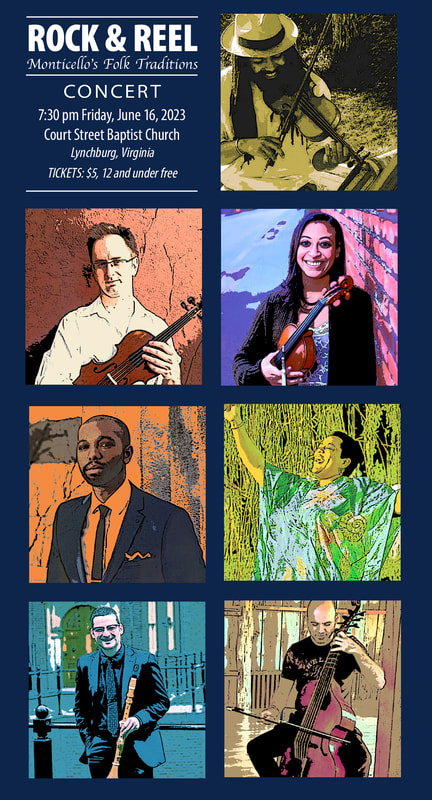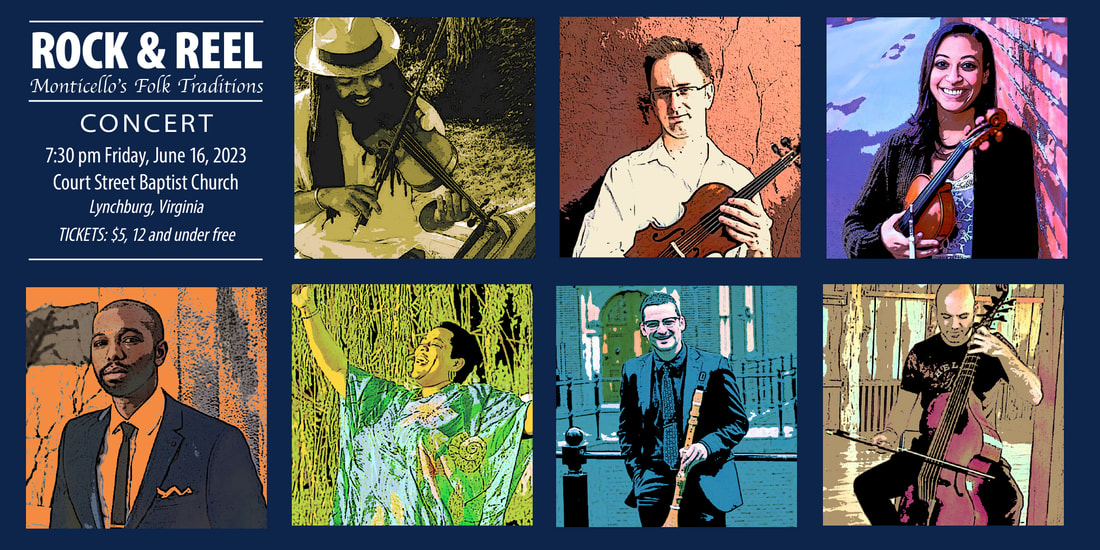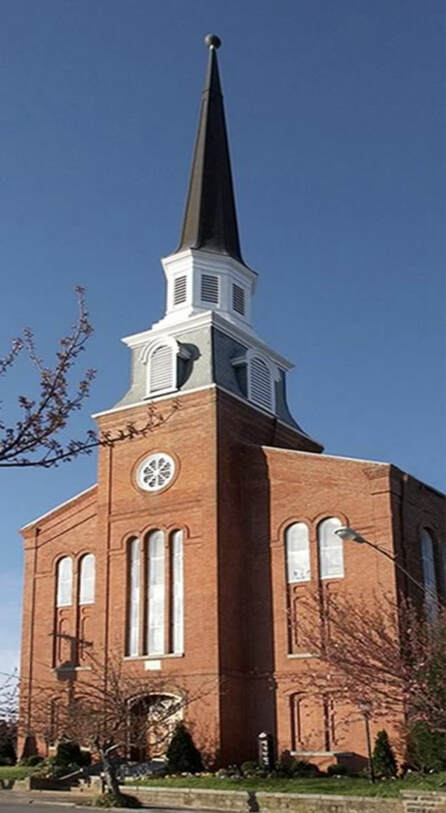JUNETEENTH
CONCERT
ROCK & REEL:
Monticello’s Folk Traditions
7:30 pm Friday, June 16, 2023
Court Street Baptist Church (517 Court Street, Lynchburg)
(Parking lot and entry from
Clay Street side).
ROCK & REEL:
Monticello’s Folk Traditions
7:30 pm Friday, June 16, 2023
Court Street Baptist Church (517 Court Street, Lynchburg)
(Parking lot and entry from
Clay Street side).
|
The Juneteenth performance “Rock & Reel: Monticello’s Folk Traditions,” will explore the musical and storytelling gifts and achievements of enslaved people of Monticello, primarily many members and descendants of the Hemings family. Their music was played almost entirely by ear, and was appreciated for its liveliness and excitement. Beverly, Madison and Eston Hemings, were the three sons of Thomas Jefferson and his enslaved chambermaid, Sally Hemings, who lived to adulthood. All three were known to have been accomplished folk fiddlers who contributed to the musical life of Monticello, Jefferson’s home near Charlottesville, VA, and later in the wider world. All three sons were born enslaved — and all were living as free men by the time they were 25. Early Music Access Project of Charlottesville has gathered an exciting group of musicians interested in historic music to try to recreate the joyous sounds of the Eston Hemings Band of Charlottesville and later Ohio and Wisconsin, and the Scott Family Band of Charlottesville. Benjamin Hunter, Carmen Johnson-Pájaro and David McCormick are all nationally and internationally known baroque violinists. Maryland-based Loren Ludwig, PhD, is both a gamba player and a researcher of African American participation in Colonial American Culture. Finally, Dominic Giardino is an active freelance historical musician and historical interpreter at the Colonial Williamsburg Foundation. In 2014, Benjamin Hunter presented a TEDx talk titled “When Folk Music Speaks.” In 2022, he presented as the season capstone for the Chautauqua Lecture Series, “The Renaissance of Folk.” He speaks at colleges, universities, conferences, and events across the country and was recently in residence at On the Boards in Seattle. David McCormick, Artistic Director of Charlottesville’s Early Music Access Project is also the Executive Director of the national organization of Early Music America and medieval fiddler CONCERT
ROCK & REEL: Monticello’s Folk Traditions 7:30 pm Friday, June 16, 2023 Court Street Baptist Church (517 Court Street, Lynchburg) (Parking lot and entry from Clay Street side). Tickets:
|
for Alkemie. Carmen Johnson-Pájaro is a performer, educator, and community-based artist in New York City in the historical performance program at The Juillard School. Historical Clarinet player Dominic Giardino moved to the Netherlands in 2016 as a U.S. Fulbright Scholar to study historical clarinets with Eric Hoeprich at the Royal Conservatoire of The Hague. He currently works at The Colonial Williamsburg Foundation. Loren Ludwig is a performer-scholar based in Baltimore, MD, who studied viola da gamba at Oberlin Conservatory and holds a PhD in Critical and Comparative Studies in Music from the University of Virginia. As a viol player, Loren performs widely as a soloist and chamber musician. He is a co-founder of critically acclaimed ensembles LeStrange Viols, the 17th-century string band ACRONYM, and Science Ficta. Dr. Ludwig’s current projects include the reconstruction of a lost tradition of ensemble string playing in New England c1800 and archival work in Virginia and Maryland uncovering evidence of the participation by African American musicians in colonial musical culture. World Premiere by Composer and Teller of Folk Tales Early Music Access Project (EMAP) commissioned composer Jonathan Woody and Virginia storyteller Sheila Arnold to retell a folk tale told to Thomas Jefferson’s children in the late 18th century. National Endowment of the Humanities recognized teller of tales Sheila Arnold will perform “Mr. Fox Tricks Mr. Rabbit and is Tricked in Return,” a tale attributed to an enslaved Monticello nursemaid. Composer Jonathan Woody has written new music to accompany this story. Woody’s compositions blend 17th- and 18th-century inspiration with the minimalism and socially conscious subject matter of today. Since 2020, he has also received commissions from Apollo’s Fire, the Choir of Trinity Wall Street, Chanticleer, the Handel and Haydn Society, the Cathedral Choral Society of Washington, DC, and the Five Boroughs Music Festival. ARTIST TALKS “Black Fiddlers of Monticello“ 2:30 pm Sunday, June 4, 2023 Amherst County Museum and Historical Society (154 South Main Street, Amherst) FREE event For more information, call 434-946-9068 or write [email protected] ARTIST TALKS “Black Fiddlers of Monticello“ 7:30 pm Sunday, June 4, 2023 Popular Forest (1776 Poplar Forest Park, Lynchburg) Tickets: $10 For more information, call 434-525-1806 or go to poplarforest.org |
THE HISTORY OF THE HEMINGS FAMILY AND SCOTT FAMILY BANDS
|
Beverly Hemings (1798-1873), the oldest of the three Hemings-Jefferson sons who grew to adulthood, worked at Monticello as a carpenter. He is also remembered as a musician, who was often asked to play violin for dances arranged by Jefferson's grand-daughters. Sometime in late 1821 or early 1822, he left Monticello, perhaps with his sister Harriet, but he was not pursued. According to his brother Madison, Beverly Hemings passed into white society and raised a family in Washington, D.C., or Maryland. There is no written record of his later life.
In his will when he died in 1826, Thomas Jefferson freed Madison Hemings (1805-1877) and his younger brother Eston (1808-1856). The brothers then moved to Charlottesville with their mother, Sally Hemings, who was unofficially freed, or “given her time,” by Jefferson’s daughter Martha Jefferson Randolph. Eston worked in carpentry and woodworking. He built a house on Main Street in 1830 and married Julia Isaacs, a mixed-race woman of color, in 1832. Madison married Mary Hughes McCoy, also a woman of mixed race. Sally Hemings passed away in 1835. Both Madison and Eston Hemings and their families then moved to Chillicothe, Ohio, to live in a free state. In Ohio, Eston Hemings earned a living as a well-known musician and entertainer. In 1852 Eston, his wife and three children moved to Madison, Wisconsin. They changed their family name to Jefferson and entered the white community. Their sons both served in the Union Army during the Civil War, and the older one, John Wayles Jefferson, achieved the rank of colonel. |
Sally Hemings was the daughter of enslaved Elizabeth (Betty) Hemings (1735–1807) daughter of an enslaved African woman and English Captain. Sally's father, the owner of Betty, John Wayles, was also the father of Thomas Jefferson's wife, Martha. Sally was half-sister to Jefferson's wife and was of approximately three quarters English descent. Martha died while married to Thomas Jefferson in 1782. In 1787, when she was 14, Sally Hemings accompanied Thomas Jefferson and one of his his daughters by Martha to Paris. There Sally was a legally free and paid servant, as slavery was not legal in France. At some time during Sally’s 26 months in Paris, the widower Thomas Jefferson began a relationship with her that produced at least six children, including the three boys who grew up to be fiddlers.
Sally Heming’s Mother was “Betty Hemings” whose relationship with an unknown man resulted in the birth of Mary Hemings Bell, whose Daughter Sally Jefferson Bell married Jesse Scott, son of Anika Cumba, of the Pamunkey Tribe, and a white man, Governor Charles Scott of Kentucky. With Jesse, Sally had four children, three of whom, Robert, James and Thomas, all became fiddlers and formed the Scott Family Band with their father. The Scott family band remained in Charlottesville and became highly successful playing for dances and celebrations. |




